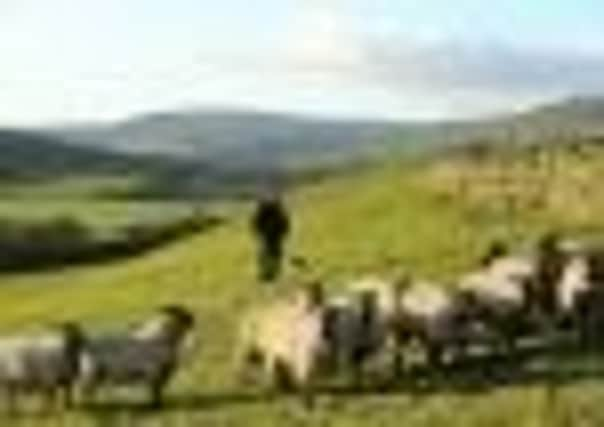Farm Of The Week: The ‘Dougal’ sheep have a bit of magic


These days, the priory itself is run as an outdoor activity and education centre with close links to the diocese of Ripon and Leeds. But the wool from the small flock of Teeswater sheep next door, at Marrick Abbey Farm, is still highly prized.
“It’s a very well sought-after wool,” Ernest Bainbridge tells me. “It has a good lustre and a good length of fleece. Off a first clip, you can expect an extension of fourteen inches. It’s actually the highest-priced wool on the Wool Marketing Board list.”
Advertisement
Hide AdAdvertisement
Hide AdLike his father before him, Mr Bainbridge, who farms in partnership with his two brothers, Sidney and Andrew, is passionate about a breed which was once at the heart of the wool industry in Yorkshire.
Nowadays, the fleeces from most Yorkshire sheep fetch the low prices dictated by what the carpet industry is prepared to pay for wool – a price which stays pegged down to somewhere near the going rate for artificial alternatives.
But Mr Bainbridge says: “A Teeswater fleece will fetch between £3.20 and £3.40 per kilo. With a fleece weighing about three kilos, that’s £10 to £12 a fleece.
“We clip our sheep ourselves. If you had a contractor coming in, it would cost anything from £1 to £1.50, because Teeswaters have wool all over and contractors don’t like them.”
Advertisement
Hide AdAdvertisement
Hide AdMr Bainbridge and his Teeswaters used to be regulars at a lot of the agricultural shows, but pressure of work has cut back on that.
He says: “We also have a haulage business, which is actually leading wools into North of England Wools in Bradford (a Wool Board collection depot). We go round all of the other farms picking all the wool up and taking it into Bradford, which takes a lot of time, so we weren’t having as much time for preparing the sheep and going to the shows. We just do the Yorkshire and Reeth shows now.”
The Teeswaters are a small part of the total flock on Marrick Abbey Farm. Mr Bainbridge has just 12 Teeswater ewes and recently got rid of his ram when it became too old to work.
“I have plenty of semen in storage, for another year or two if need be,” he says. “I’ve had good rams over the years, and got semen off them, and when I can fetch them into the flock again I do so.”
He concentrates on producing top ewes.
Advertisement
Hide AdAdvertisement
Hide Ad“I like to sell them to other people to use for breeding, and also people who cross them with the horned ewes (Swaledales) to produce the Mashams. Of late we’ve had some very good sales. A lot of the people at the top of the Mashams have used our bloodlines, and I’ve also exported to Ireland. I’ve exported semen all the way to America as well.”
Although classified as a minority breed, rather than rare, the Teeswater isn’t overwhelmed with bloodlines, and Mr Bainbridge is waiting for a ram to arrive from Northern Ireland which he hopes will help.
He says: “There are a lot of rare breed people coming into the Teeswater Society who are running just one or two sheep. People like the look of them.”
The general public often call them ‘Dougal sheep’, after a character with a similar hairstyle in the old TV series The Magic Roundabout.
Advertisement
Hide AdAdvertisement
Hide AdThe Bainbridges farm 780 acres at Marrick Abbey – a mixture of ‘in-bye’ land and moors stretching up above the Swale. Besides the Teeswaters, the main flock is 500 Swaledales, the ‘horned ewes’, which are put to Blue Faced Leicester rams to produce Mules – the ewe breed favoured by farmers producing lambs for the dinner table.
Unlike the Swaledales, the Teeswater sheep aren’t naturally a hill breed and don’t spend their entire lives outside.
“We do fetch the Teeswaters in during the winter: they’ll be coming in around about now,” Ernest Bainbridge says. “But they have been out during extreme weather. Last year, they stayed out during the snow and they were perfectly OK. They’ve got a good quality of wool on them. They are quite hardy, considering they’re a lowland sheep.”
For many farmers, he says, the fleece on a sheep has become just a nuisance to be dealt with.
Advertisement
Hide AdAdvertisement
Hide Ad“Years ago, the wool cheque used to pay the rent for the farm,” he says. “But over the last decade or so, wool has been such a bad price it’s hardly been worth taking off the sheep. The contractors cost more than the wool’s been worth.”
Because the wool from the Teeswater is so exceptional, it can end up in some very important places.
“I know in 1988, when the Olympic team went out, the lining of their suits was made from Teeswater wool,” says Mr Bainbridge.
“There’s Teeswater and Dalesbred in the Bainbridge blood. I just can’t let them go.”
Advertisement
Hide AdAdvertisement
Hide AdThe British Wool Marketing Board will be at work at the Eastern Region NSA Winter Fair at Melton Mowbray on Friday.
Producer relations manager Gareth Jones said this week: “While current auction wool prices are strong, to ensure these prices are maintained in the current economic climate we need to ensure that consumers understand the many beneficial qualities of British wool.”
The BWMB chairman, Northumbrian farmer Malcolm Corbett, will be there to argue the case for farmers supporting the wool board auction system despite being offered a simpler deal by rival buyers.
He said: “Farmers may not always appreciate the work BWMB does throughout the supply chain.
“But it is the organisation’s complete chain involvement which places BWMB in a unique position to be able to help the UK sheep industry extract maximum value from its wool ... no matter what breed.”